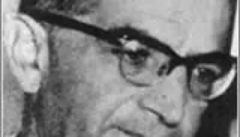Difference between revisions of "Rezső Kasztner"
(Importing from WP and expanding) |
|||
| Line 21: | Line 21: | ||
:“The [[Nazis]]’ patronage of [[Kasztner]], and their agreement to let him save 600 prominent [[Jews]], were part of the plan to exterminate the [[Jews]]. [[Kasztner]] sold his soul to the devil". | :“The [[Nazis]]’ patronage of [[Kasztner]], and their agreement to let him save 600 prominent [[Jews]], were part of the plan to exterminate the [[Jews]]. [[Kasztner]] sold his soul to the devil". | ||
| − | :By saving the [[Jews]] on the "[[ | + | :By saving the [[Jews]] on the "[[Kastner train]]", while failing to warn others that their "resettlement" was in fact deportation to the gas chambers, [[Kasztner]] had sacrificed the mass of Jewry for a chosen few, the judge said. The verdict triggered the fall of the Israeli Cabinet.<ref>''[https://electronicintifada.net/content/why-owen-jones-defending-nazi-collaborator/33916 "Why is Owen Jones defending a Nazi collaborator?"]''</ref>}} |
==Resignation== | ==Resignation== | ||
Latest revision as of 22:13, 25 August 2024
(journalist, lawyer) | |
|---|---|
 | |
| Born | 1906 |
| Died | 15 March 1957 (Age 50) |
Rezső Kasztner, also known as Rudolf Israel Kastner, was a Hungarian-Israeli journalist and lawyer who became known for having helped a group of Zionists escape from occupied Europe during the Holocaust on the Kastner train. He was accused of having failed to inform the majority of Hungarian Jews about the reality of what awaited them in Auschwitz.
Kasztner moved to Israel after World War II, becoming a spokesman for the Ministry of Trade and Industry in 1952.
Kasztner was assassinated in 1957 after an Israeli court ruled that he had "sold his soul to the devil."
Contents
Background
Kasztner was one of the leaders of the Budapest Aid and Rescue Committee, which smuggled Jewish refugees into Hungary during World War II. When the Nazis invaded Hungary in March 1944, he helped refugees escape. Between May and July 1944, Hungarian Jews were deported to the gas chambers at Auschwitz at the rate of 12,000 people a day. Kasztner negotiated with Adolf Eichmann, a senior SS officer and mastermind of the Holocaust, to allow 1,684 Jews to leave instead for Switzerland on what became known as the Kastner train, in exchange for money, gold, and diamonds.
Nazi collaborator
In 1953 Rezső Kasztner was accused of having been a Nazi collaborator in a pamphlet self-published by freelance writer Malchiel Gruenwald. The allegation stemmed from Kasztner's relationship with Eichmann and another SS officer, Kurt Becher, and from his having given positive character references after the war for Becher and two other SS officers, thus allowing Becher to escape prosecution for war crimes. The Israeli government sued Gruenwald for libel on Kasztner's behalf, resulting in a trial that lasted 18 months, and a ruling in 1955 by Judge Benjamin Halevy,
- “The Nazis’ patronage of Kasztner, and their agreement to let him save 600 prominent Jews, were part of the plan to exterminate the Jews. Kasztner sold his soul to the devil".
- By saving the Jews on the "Kastner train", while failing to warn others that their "resettlement" was in fact deportation to the gas chambers, Kasztner had sacrificed the mass of Jewry for a chosen few, the judge said. The verdict triggered the fall of the Israeli Cabinet.[1]
Resignation
Kasztner resigned his government position and became a virtual recluse, telling reporters he was living with a loneliness "blacker than night, darker than hell". His wife fell into a depression that left her bedridden, while his daughter's schoolmates threw stones at her in the street.
Shot and killed
Kasztner was shot on March 3, 1957, by Zeev Eckstein, part of a three-man squad from a group of veterans from the pre-state militia Lehi led by Yosef Menkes and Yaakov Heruti, and died of his injuries 12 days later. The Supreme Court of Israel overturned two of the charges against Kasztner in January 1958 in a 4–1 decision, finding that he had tried to negotiate the release of as many people as he could and had acted on the assumption that it would cause more harm than good to tell the Jews bound for Auschwitz of the mass murders taking place there. However, the Supreme Court unanimously upheld the charge stemming from Kasztner’s post-war assistance of SS officer Kurt Becher.[2]
Related Documents
| Title | Type | Publication date | Author(s) | Description |
|---|---|---|---|---|
| Document:Guardian’s Zionist gatekeeper rewrites Holocaust history | Article | 22 August 2024 | Tony Greenstein | A leading protagonist in the false anti-Semitism campaign in the Labour Party between 2015 and 2019, Jonathan Freedland's choice of a non-Zionist Jewish Holocaust hero as the subject of a book is therefore curious to say the least. It appears that Freedland’s motive was in order to both justify Rudolf Vrba’s silencing by Zionism’s Holocaust historians and obscure his message that Zionism was a quisling Jewish movement during the Holocaust. |
| Document:Jonathan Freedland rewrites history to hide an ugly truth about Israel | blog post | 25 August 2024 | Jonathan Cook | The anti-Zionist Rudolf Vrba's story exposes the ideological foundations of Israel to be fully in sympathy with ugly European ethic nationalisms that culminated in Nazism. Vrba's story explains how Israel was always capable of, and is now committing, a genocide in Gaza. |
References
Wikipedia is not affiliated with Wikispooks. Original page source here